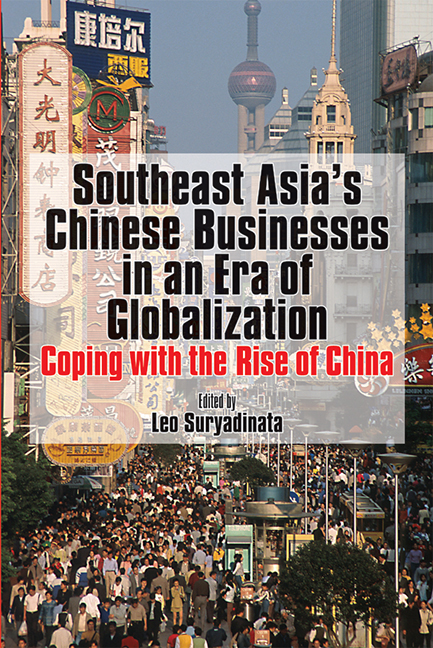Book contents
- Frontmatter
- Contents
- The Contributors
- Introduction
- China and Southeast Asia
- Indonesia
- Malaysia
- 6 China's Economic Rise and Its Impact on Malaysian Chinese Business
- 7 Competition, (Ir)relevance and Market Determinations: Government Economic Policies and Ethnic Chinese Responses in West Malaysia
- 8 Malaysian Chinese Businesses in an Era of Globalization
- The Philippines
- Singapore and Thailand
- Index
6 - China's Economic Rise and Its Impact on Malaysian Chinese Business
from Malaysia
Published online by Cambridge University Press: 21 October 2015
- Frontmatter
- Contents
- The Contributors
- Introduction
- China and Southeast Asia
- Indonesia
- Malaysia
- 6 China's Economic Rise and Its Impact on Malaysian Chinese Business
- 7 Competition, (Ir)relevance and Market Determinations: Government Economic Policies and Ethnic Chinese Responses in West Malaysia
- 8 Malaysian Chinese Businesses in an Era of Globalization
- The Philippines
- Singapore and Thailand
- Index
Summary
INTRODUCTION
The impact of a rising China on Malaysia has been in evidence over the last ten years or so. On the positive side the opening of China offers opportunities to Malaysian investors, in particular, Malaysian Chinese investors. There are those who see possible high returns from investments in a country where many fields of business have yet to fully develop. Furthermore there is expectation that Malaysia would benefit from a growing market as China further opens up her economy. Indeed China has long been one of the largest buyers of Malaysian commodities such as rubber and palm oil.
On the negative side, China is, firstly, attracting a huge proportion of foreign direct investment (FDI). Since 1997–98 there has been a decline of FDI to the ASEAN region including Malaysia. There are those who argue that the FDI that went to China might have gone to the ASEAN states. However, the FDI decline in ASEAN was due also to reasons exposed by the Asian financial crisis — weak accountability, non-transparency and cronyism — and the region has not entirely recovered from that.
Secondly, the rise of China has led to competition for export markets, with Malaysian producers losing out to cheaper goods from China. In addition, cheaper costs of production in China have also encouraged a relocation of factories from Malaysia and this has led to job loss and the multiplier consequence to the general economy in a particular region when factories close down. There is also the loss of technology transfer when a foreign-owned factory leaves.
This chapter looks at the impact of the rise of China on the Malaysian Chinese economy. At the outset, it has to be stated that the economy of the Malaysian Chinese, being part of and integrated into the general Malaysian economy, cannot easily be separated and analyzed in isolation. However, there is an economy which is recognizably Chinese in ownership and management, both in the general perception as well is in governmental policy. The chapter will focus on this economy though it needs to be pointed out that the impact of the rise of China on the Malaysian Chinese economy must be understood within the impact on the broader Malaysian framework.
- Type
- Chapter
- Information
- Southeast Asia's Chinese Businesses in an Era of GlobalizationCoping with the Rise of China, pp. 162 - 190Publisher: ISEAS–Yusof Ishak InstitutePrint publication year: 2006



